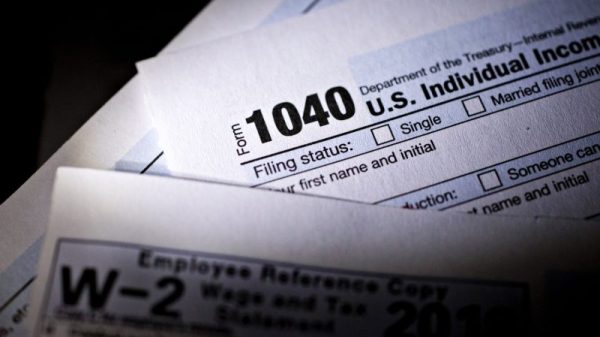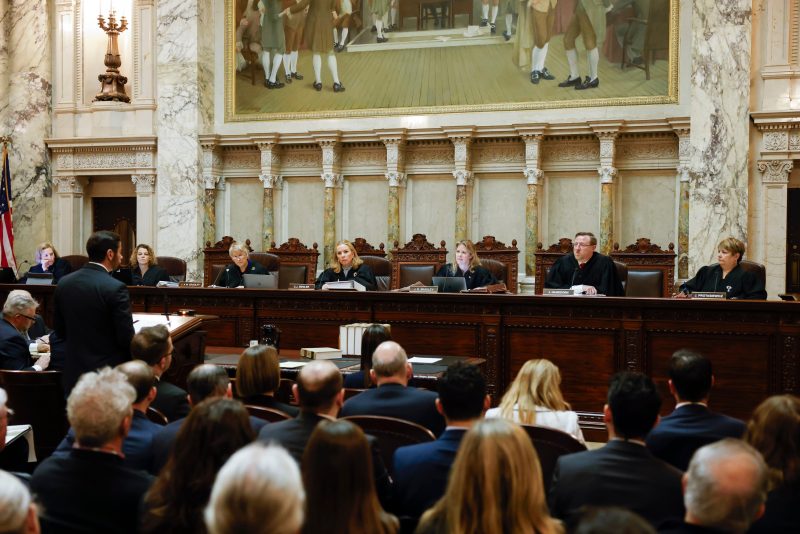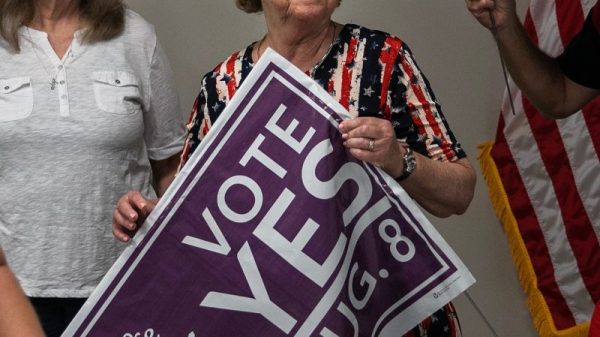The Wisconsin Supreme Court on Friday overturned Republican-favored legislative maps, ordering new boundary lines for the state less than a year before the 2024 election.
In a 4-3 decision along ideological lines, the justices said that at least 50 of the 99 Assembly districts and at least 20 of the 33 Senate districts in the map violate a mandate in the state’s constitution that requires state legislative districts be composed of “contiguous territory.” Many of the state’s districts include portions that are not attached to other parts of the same district.
The justices said they would give lawmakers and Wisconsin Gov. Tony Evers (D) the initial opportunity to approve new maps, but they set the stage for the court to draw them if the Republican-controlled legislature and the governor reach an impasse.
The justices said if it fell to them, they would choose maps that are contiguous, are compact, have equal populations and comply with state and federal laws. In addition, the court “will take care to avoid selecting remedial maps designed to advantage one political party over another,” Justice Jill Karofsky wrote for the majority.
After Friday’s decision, the Republican leader of the Wisconsin Assembly, Speaker Robin Vos, said in a statement that he believed “the case was pre-decided before it was even brought.”
“Sad day for our state when the State Supreme Court just said last year that the existing lines are constitutional. The U.S. Supreme Court will have the last word,” Vos added.
The Wisconsin decision comes a day after a three-judge panel ruled that the boundaries of 13 Michigan legislative districts in the Detroit area must be redrawn, after judges found that the map was illegally influenced by race. Litigation disputing district boundary lines enacted after the 2020 Census is ongoing in more than a dozen states.
The court decision in Wisconsin could be consequential for Democrats hoping to benefit in the next vote. Republicans hold huge majorities in the state legislature because of maps that greatly favor them. Republicans first drew lopsided maps in 2011, when they controlled all of state government, and conservatives on the state Supreme Court used them as models for new maps in 2022 when they controlled the court.
Making the maps more politically neutral would benefit Democrats who had been shut out of power for years. Republicans hold a 64-35 majority in the Wisconsin Assembly and a 22-11 majority in the state Senate. In presidential elections, the battleground state has been decided by the smallest of margins for Democratic and Republican candidates.
The state had to draw new maps after the 2020 Census, but by then voters had elected Evers, a Democrat. Evers and legislators could not agree on new districts, and the state Supreme Court — which at the time was controlled by conservatives — had to decide how to draw the lines. The court chose new maps that were based on the 2011 maps, thus giving Republicans a big advantage in the 2022 elections.
Liberals took control of the Wisconsin Supreme Court in August, and soon afterward, a group of voters brought a new lawsuit over the maps.
Wisconsin Attorney General Josh Kaul (D) said in a statement that the “decision marks a sea change.” Evers also said that he agreed with the court’s decision.
“Wisconsin is a purple state, and I look forward to submitting maps to the Court to consider and review that reflect and represent the makeup of our state,” Evers said in a statement. “And I remain as optimistic as ever that, at long last, the gerrymandered maps Wisconsinites have endured for years might soon be history.”
Legal groups that had sought to challenge the maps also celebrated the decision.
“We’re gratified that the Court agreed that the Senate and Assembly maps violate the Wisconsin Constitution,” said Sam Hirsch, who argued before the Wisconsin Supreme Court on behalf of the petitioners.
Dan Lenz, staff counsel for the firm Law Forward, said in a statement that its team “will be working to draw constitutional, fair, representative maps and will provide more information in the coming weeks.”
Mark Gaber, senior director of redistricting at the Campaign Legal Center, said that “Democracy won today in Wisconsin.”
And Michael Adame, senior staff attorney at the Public Rights Project, which filed an amicus brief in support of challenging the maps, said the court “sent an unequivocal message that the current legislative maps cannot stand.”
The case has been politically fraught. Liberals took control of the state’s high court this year when Janet Protasiewicz won an 11-point victory in what turned out to be the most expensive court election in U.S. history.
During the campaign, Protasiewicz touted her support for abortion rights and repeatedly referred to the GOP-friendly maps as “rigged.” Republicans said they did not believe she could be fair and at one point threatened to impeach her. However, they have since backed off.
The conservatives on the court’s minority portrayed Friday’s decision as partisan.
“This deal was sealed on election night,” Chief Justice Annette Ziegler wrote in the opening statement of her dissent.
Justice Rebecca Bradley wrote that the court’s liberals “undermine democracy,” calling them “handmaidens of the Democratic Party.”





























